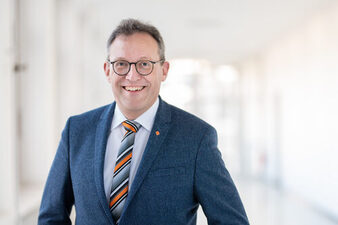Biomedical engineering deals with questions such as
- How can valid and medically relevant information from patients' everyday lives be integrated into diagnosis and treatment?
- How can technical assistance systems promote health and maintain quality of life for longer in old age?
- How can medical signals be evaluated so that diseases can be detected at an early stage?
Theory and practice from rehabilitation technology to virtual reality
The six-semester (seven semesters with a practical semester) application-oriented course is divided into various subject areas. You will acquire the necessary basic knowledge of mathematics, systems theory and physics for engineers. This is supplemented by the basics of computer science and electrical engineering. Medical fundamentals for engineers and practical project-oriented work are an essential element of the course right from the start.
In the subject area of medicine, you will gain insights into the physiology and anatomy of the human body as well as the biochemical interaction at cell level. Special emphasis is placed on cardiology and neurophysiology. Various methods of diagnosis and therapy are also on the curriculum, as are regulations and standards, such as those formulated in the Medical Devices Act. Engineers work together with medical professionals on an interdisciplinary basis to develop systems that record and evaluate medical data. The interaction between humans and technology is particularly important for the benefit of patients.
Bachelor of Science and protected title "Ing."
After successfully completing the program, you will receive a Bachelor of Science (B.S.) degree. At the same time, you will have the right to use the protected professional title of engineer.


